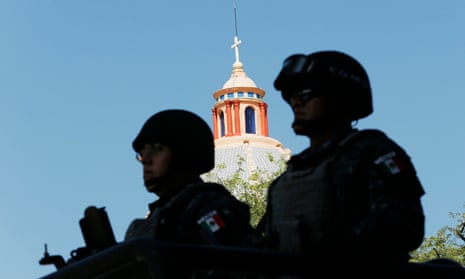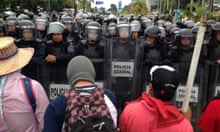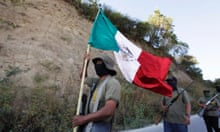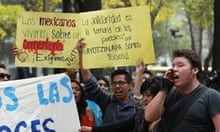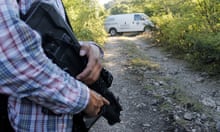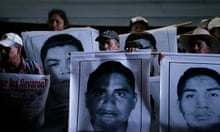The terrible wave of violence gripping Mexico is back in the news, with the discovery of a mass grave holding 28 bodies in the city of Iguala, Guerrero. The bodies were dismembered and burnt to such an extent that Mexican officials believe it will take up to two months to formally identify them, but there is speculation that they could be those of students, 43 in total, who went missing on 26 September.
The students had clashed with police as they solicited donations to fund a protest against cuts to their state-funded school. At least six students and bystanders were killed, and prosecutors arrested 22 police officers after witnesses accused them of handing the students over to a gang to be executed. The mayor and police chief of Iguala are now on the run after being subpoenaed in the case, though it’s still unclear whether the mass grave and the missing students are connected.
Mexico is a country accustomed to astonishing levels of violence and endemic corruption. During Felipe Calderón’s presidency (2006-2012), 60,000 people were killed and 150,000 displaced as a result of drug-related violence, with 98% of all crimes going unpunished. But even by these standards, the discovery of the mass grave and its possible link to the missing students is shocking, in part because of the extent of alleged subservience of the authorities to criminal gangs, and also because the students are innocents with no criminal connections. Mexico’s current president, Enrique Peña Nieto, says he is “dismayed and perplexed” by the discovery of the mass grave. It’s likely he will feel a lot worse if it transpires the bodies are indeed those of the missing students, especially as Mexicans are now preparing for nationwide protests in response to the students’ disappearances.
The horror of the mass grave and the missing students must be seen in the context of Mexico’s war on drugs. Calderón advocated a predominantly military response to the drug war, which led to high levels of support and political impunity for Mexico’s security services, which then went on to commit exactly the kinds of atrocities that appear to have been carried out against the missing students.
When Peña Nieto was elected, he promised a less military approach, but he has failed to seriously depart from his predecessor’s policies. This insistence on responding to the drug war militarily is ludicrous. At root its causes – both in Mexico and Latin America as a whole – are social: namely inequality, poverty and mass unemployment. According to the social development agency Coneval, half of Mexico’s population lives in poverty. Nevertheless, the country’s militaristic response to the drug war is encouraged by US foreign policy, namely in the form of the Merida Initiative”, a regional security cooperation agreement that supplies Mexico with $1.9bn of military aid.
Grace Livingstone, author of America’s Backyard, says: “In the name of fighting the so-called war on drugs, the US has poured millions of dollars worth of military aid into Mexico, militarising the society and strengthening the armed forces, which already had a poor record on human rights and were notorious for persecuting social activists including students, trade unions and peasant campaigners.”
A 2011 documentary for al-Jazeera even went so far as to suggest that the drug war is used by the Mexican security services as simply a pretext for oppressing those who attempt to campaign for social justice. Earlier this year, the Washington Office for Latin America criticised the Mexican government for dragging its heels over the protection of human rights defenders and journalists.
It is undeniable that the US dishes out extravagant amounts of military aid to Mexico with a scandalous lack of oversight as to how it is used. According to Amnesty International: “In August [2012], despite the failure of Mexican authorities to meet human rights conditions set by the US Congress as part of the Merida initiative, the US State Department recommended that Congress release the 15% of funds subject to the conditions.” This aid may have since been spent on equipment and training of the same security services that prosecutors are now accusing of the extrajudicial execution of students, many of whom are teenagers.
The US must learn serious lessons about its relationship with Mexico and ask the country to make a genuine commitment to tackling human rights violations and the excruciating inequality that is fomenting the drug war. Moreover, the Americas must follow the progressive lead of countries such as Uruguay and Bolivia in exploring alternatives to a military response to the war on drugs, which has been an unmitigated failure of violence, corruption and oppression.
Soon there will be 43 Mexican families who have to live with the knowledge that their loved one was unearthed in a mass grave. We owe it to them to be honest about the factors that put them there.
